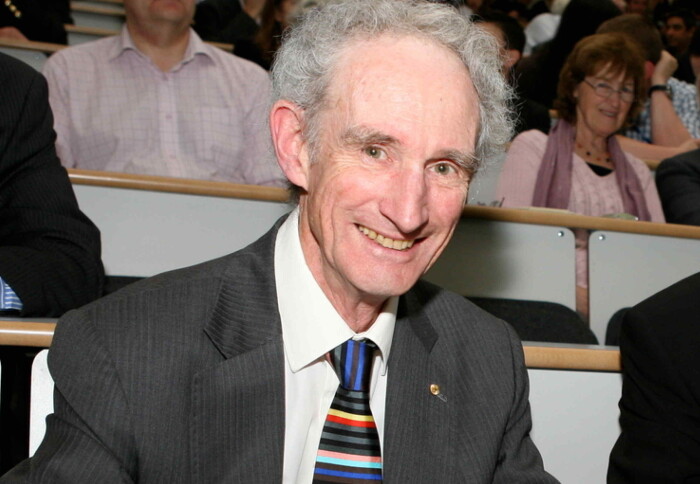
by Daniel Mapp
A generous £375,000 donation will fund a new scholarship programme, supporting Master’s students in epidemiology and computational ecology.
The Lord Robert May Scholarship honours Professor May’s legacy and long-standing ties to Imperial, enabling six students over the next three years to pursue studies in disciplines shaped by his work.
The new scholarship programme will fund two students each year – with both home and overseas candidates eligible – to study on the MSc in Epidemiology, based in the School of Public Health, and the MSc in Computational Methods in Ecology and Evolution, based at Silwood Park. Both programmes reflect Lord May’s influence on theoretical ecology, disease transmission modelling and policy-driven science.
The gift, which was made in June 2025 by Lady May, celebrates Lord May’s decades-long relationship with Imperial and his lasting contributions to global science and public policy. By removing financial barriers, the scholarship will open doors to students who share Lord May’s interests in health, sustainability and evidence-based policy.
Professor Deborah Ashby, Dean of the Faculty of Medicine, said: “It is a great privilege to be able to celebrate Lord May’s life and achievements through this scholarship. By helping to develop future leaders in epidemiology and ecology, the scholarship reflects the values that Lord May championed – scientific rigour, interdisciplinary thinking and real-world impact.”
Lord Robert May of Oxford (1936–2020) was the leading theoretical ecologist of his generation, a pioneering individual who reshaped understanding of complex systems in ecology, epidemiology and beyond. Originally trained as a theoretical physicist at the University of Sydney, he went on to bring a new level of mathematical precision to the life sciences, helping to establish the foundations of theoretical ecology and revolutionising infectious disease modelling.
His relationship with Imperial began in the late 1960s, when he collaborated with researchers at Silwood Park, working alongside figures such as Sir Richard Southwood and Sir Roy Anderson. These collaborations played a key role in the emergence of modern population and disease ecology, and contributed to Silwood Park’s global reputation for ecological research.
In 1988, Lord May was appointed to a Royal Society Research Professorship jointly held at Imperial and the University of Oxford. He remained closely connected to Imperial throughout his career, mentoring researchers and influencing generations of students. In recognition of his contributions, he was made a Fellow of Imperial College in 1997.
Beyond academia, Lord May held several prominent public roles, including UK Government Chief Scientific Adviser (1995–2000), where he advised ministers on the handling of a wide variety of scientific concerns, including conservation and biodiversity, resource management, pest control, food policy, genetically modified (GM) crops and foods, sustainable agriculture, international development and infectious disease control. In 2000, he was elected to one of the most prestigious posts in science, the presidency of the Royal Society, the UK’s national academy for science, where he served until 2005. A founding member of the UK’s Committee on Climate Change, he was known for his commitment to applying science to public policy and addressing global challenges.
Professor Richard Craster, Dean of the Faculty of Natural Sciences, said: “Lord May’s pioneering work in mathematical ecology and his role in the ‘Silwood Circle’ not only transformed our understanding of ecological systems but also established Imperial as a global hub for theoretical ecology. Lord May’s legacy continues to inspire Imperial’s academic and student community to this day – and I am grateful that we are able to recognise this connection through the creation of the Lord Robert May Scholarship.”
With limited funding for taught postgraduate study in the UK, the cost of a Master’s degree can pose a serious barrier for many students, particularly those from disadvantaged backgrounds or who pay higher ‘overseas’ tuition fees. The Lord Robert May Scholarship will help ensure that financial constraints do not deter exceptional candidates from applying for or accepting a place at Imperial. Over time, the initiative aims to build a community of Lord May Scholars, each contributing to impactful work in public health and environmental science.
Kristin Blanchfield, Vice-President (Advancement), said: “Students with a passion for ecology or epidemiology will already be familiar with Lord May’s work – and receiving a scholarship in his name will be both a privilege and inspiration. This generous support will not only change lives but honour a scientific legacy that continues to be felt at Imperial today.”
Article text (excluding photos or graphics) © Imperial College London.
Photos and graphics subject to third party copyright used with permission or © Imperial College London.
Daniel Mapp
Advancement
Scholarships, Philanthropy
See more tags
Main campus address:
Imperial College London, South Kensington Campus, London SW7 2AZ, tel: +44 (0)20 7589 5111
Campus maps and information | About this site | This site uses cookies | Report incorrect content | Log in
